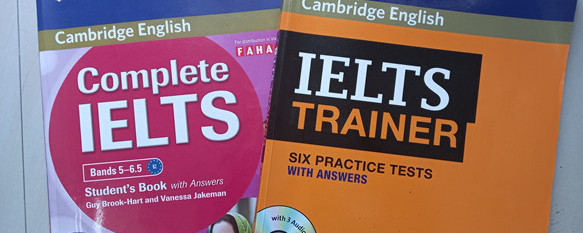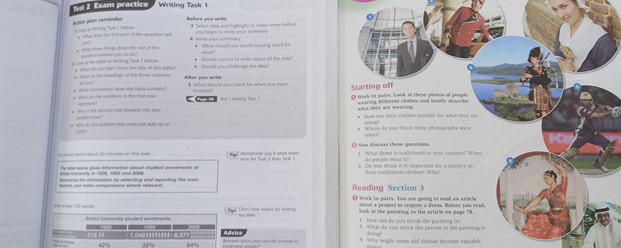IELTS or the International English LanguageTesting System is a test for study, migration or work. Over 3 million people take the test every year. IELTS ic accepted by over 10,000 employees, universities, schools and immigration departments around the globe.
The test measures the language proficiency of those who want to work or study in countries where English is the native language spoken. This includes the UK, USA, Australia, New Zealand and Canada. Having a good mark in these tests will help with the immigration process.
There are 2 IELTS tests a test taker can choose from. This includes IELTS Academic and IELTS General Training. Both test types assess the test taker’s ability in speaking, listening, reading and writing in English. The academic module is taken by those who want to enter undergraduate or post graduate studies for professional reasons. And the general module is taken by those who want to enter vocational or non degree training programs. Or for admission to secondary schools and for immigration purposes.
Both modules are made up of 4 parts. Listening, Reading, writing and speaking. The listening and speaking are the same for both modules but the reading and writing tests are different.
IELTS is available at more than 1,600 locations worldwide and is jointly owned by the British Council, IDP, IELTS Australia and Cambridge Assessment English..
Teacking IELTS can be very profitable but because of the rigidity of the course and the content that must be covered it can also be somewhat boring for both the student and teacher. At the moment in Vietnam there seems to be a push from the parents to start IELTS training at a fairly young age. This is something I will not do as there needs to be some degree of life skills for the average student. I would be hesitant to offer this to anyone under 15 ( Dependent on maturity) I did have 1 student who was very good and at 14 years of age passed IELTS at the band 7 level.

IELTS test scores range from 1 to band 9. Each band represents the level of attainment of the student.
IELTS test scores
IELTS results are scored on a scale of 1-9. The score that your students need to achieve will vary depending on the individual institution requirements.
Band scoreSkill levelDescription9Expert userThe test taker has fully operational command of the language. Their use of English is appropriate, accurate and fluent, and shows complete understanding.
8Very good userThe test taker has fully operational command of the language with only occasional unsystematic inaccuracies and inappropriate usage. They may misunderstand some things in unfamiliar situations. They handle complex and detailed argumentation well.
7Good userThe test taker has operational command of the language, though with occasional inaccuracies, inappropriate usage and misunderstandings in some situations. They generally handle complex language well and understand detailed reasoning.
6Competent userThe test taker has an effective command of the language despite some inaccuracies, inappropriate usage and misunderstandings. They can use and understand fairly complex language, particularly in familiar situations.
5Modest userThe test taker has a partial command of the language and copes with overall meaning in most situations, although they are likely to make many mistakes. They should be able to handle basic communication in their own field.
4Limited userThe test taker’s basic competence is limited to familiar situations. They frequently show problems in understanding and expression. They are not able to use complex language.
3Extremely limited userThe test taker conveys and understands only general meaning in very familiar situations. There are frequent breakdowns in communication.
2Intermittent userThe test taker has great difficulty understanding spoken and written English.
1Non-userThe test taker has no ability to use the language except a few isolated words.
0Did not attempt the testThe test taker did not answer the questions.
The IELTS academic module for test purposes is broken down into;
1) Listening; Approximately 30 minutes with 40 questions in four sections
2) Reading; One hour with 40 questions in 3 sections.
3) Writing; ! hour with 2 compulsory tasks.
4) Speaking; 11 – 14 minutes with an examiner covering a range of topics from the familiar to general questions.
Tips for students
In your IELTS speaking test it is best to use a wide range of vocabulary to show off your skills when you are asked to describe your favourite and least favourite book and any other question asked.

.
Could you teach IELTS
Technically there are no requirements to become an IELTS teacher, however teaching IELTS means you need to have a level of knowledge of the English language and how it is used. You need a very good range of vocabulary and a strong grasp of English grammar. If you believe you have that or at least can learn on a steep learning curve then you the possibility of being able to teach IELTS. On the personal side it is very rewarding when you see one of your students pass the exam and travel to another country or get the job they want. It can also be rewarding financially with returns of $50 to $100 per hour not uncommon for a good teacher. On the downside there is a lot of marking and homework. And as mentioned before because of the format of learning it can be boring. Try to break up the study with coffee breaks and dinner now and again.
There are many professional development opportunities for teachers and you can find plenty of support materials on their website, ( www.ielts.org) blog and YouTube channel.
So if you want to develop your skills and become an IELTS teacher the pathh is open for you. If you wish to leave any comments please feel free to do so.
Resources for teaching
The official cambridge guide to IELTS
“>Cambridge Vocabulary for IELTS book with answers and audio CD
Cambridge IELTS 12 Academic students book with answers. With audio. IELTS practise tests.
“>Cambridge grammar for students IELTS book
My preference is to keep with the cambridge books as they are the official books used.

Great idea here for another quite untapped market. It is wonderful that the internet has made it simple to get employment for yourself in so many more fields than we used to. If you have a great command of the English language, why not use it to help others with their tests so that they too can form better lives for themselves.
I think that in order to perform this type of work successfully one would need lots of patience and also a good way of communicating and teaching that makes it easy for your learners to pick up what you are trying to teach them.
Thanks Michael.
It certainly is a nice feeling when you can get to help other people achieve their dreams. And yes you are right, you do need a lot of patience and a certain amount of empathy to teach English as a Second language. If you take it slowly with the learner they will pick up what is being learnt. Thanks again for your input.
Hello Steve,
What a fantastic website! I love that your motivation is to help people understand and avoid conflict. Being a peacemaker is quite noble. Your life in Vietnam must be wonderful. Teaching and mentoring individuals to pass the IELTS would be amazing! Unfortunately, I’m not able to live in Vietnam. Can any of the teaching be done online?
Thanks,
Keep up the super work
Tamara
Thankyou Tamara for your wonderful words. Yes you can teach on line and a lot more people are doing it because of Covid. Look at my website as there is a section about teaching on line. All the best in your future endevours.
I can only imagine what adults learning a new language have to go through. I was lucky to be born in a country with an British legacy. Despite having local languages, English is used in all formal schools. I believe it would be more practical to teach newer languages while still young when the brain is more receptive to new thoughts. If this is not possible then I believe such a program like IELTS can be utilized. The flipside though is passing it usually opens up more worldwide opportunities than would have been available in one own’s country.